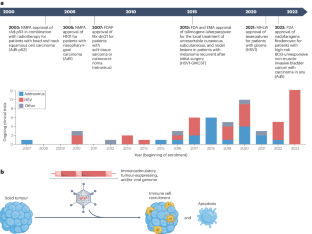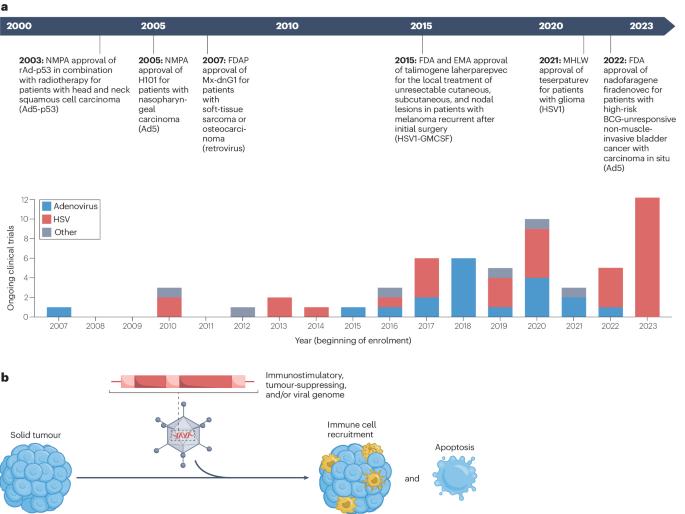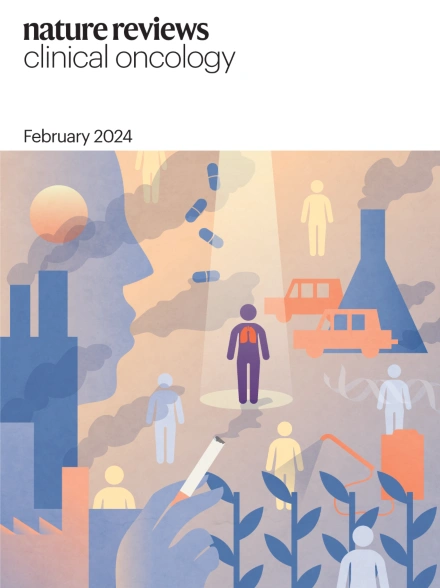治疗实体瘤患者的核酸类药物
IF 82.2
1区 医学
Q1 ONCOLOGY
引用次数: 0
摘要
对晚期实体瘤患者的治疗通常采用多模式方法(包括手术、化疗、放疗、靶向治疗和/或免疫治疗),但这些方法最终往往无效。以核酸为基础的药物,无论是作为单一疗法还是与标准疗法相结合,都正在迅速成为能够对难治性肿瘤产生疗效的新型疗法。这些疗法包括使用病毒载体(也称为基因疗法)的疗法(其中几种现已获得监管机构批准),以及含有 mRNA 和一系列其他核苷酸的纳米颗粒。在本综述中,我们将介绍以病毒和非病毒核酸为基础的治疗方法的发展和临床活动,包括其作用机制、耐受性和实体瘤患者的现有疗效数据。我们还介绍了肿瘤微环境对全身给药和局部给药的影响。最后,我们将讨论正在进行的临床试验和临床前测试的重要趋势,以及下一代治疗实体瘤患者的核酸制剂在生产和/或稳定性方面的注意事项。本文章由计算机程序翻译,如有差异,请以英文原文为准。


Nucleic acid-based drugs for patients with solid tumours
The treatment of patients with advanced-stage solid tumours typically involves a multimodality approach (including surgery, chemotherapy, radiotherapy, targeted therapy and/or immunotherapy), which is often ultimately ineffective. Nucleic acid-based drugs, either as monotherapies or in combination with standard-of-care therapies, are rapidly emerging as novel treatments capable of generating responses in otherwise refractory tumours. These therapies include those using viral vectors (also referred to as gene therapies), several of which have now been approved by regulatory agencies, and nanoparticles containing mRNAs and a range of other nucleotides. In this Review, we describe the development and clinical activity of viral and non-viral nucleic acid-based treatments, including their mechanisms of action, tolerability and available efficacy data from patients with solid tumours. We also describe the effects of the tumour microenvironment on drug delivery for both systemically administered and locally administered agents. Finally, we discuss important trends resulting from ongoing clinical trials and preclinical testing, and manufacturing and/or stability considerations that are expected to underpin the next generation of nucleic acid agents for patients with solid tumours. Nucleic acid-based therapies offer an alternative to traditional cancer treatment modalities, with promising data beginning to emerge. In this Review, the authors describe the design and development of nucleic acid-based therapies administered virally and non-virally, including discussions of the advantages and disadvantage of each approach, as well as the role of patient-specific factors such as the tumour microenvironment, and consider the most promising future research directions.
求助全文
通过发布文献求助,成功后即可免费获取论文全文。
去求助
来源期刊
CiteScore
99.40
自引率
0.40%
发文量
114
审稿时长
6-12 weeks
期刊介绍:
Nature Reviews publishes clinical content authored by internationally renowned clinical academics and researchers, catering to readers in the medical sciences at postgraduate levels and beyond. Although targeted at practicing doctors, researchers, and academics within specific specialties, the aim is to ensure accessibility for readers across various medical disciplines. The journal features in-depth Reviews offering authoritative and current information, contextualizing topics within the history and development of a field. Perspectives, News & Views articles, and the Research Highlights section provide topical discussions, opinions, and filtered primary research from diverse medical journals.

 求助内容:
求助内容: 应助结果提醒方式:
应助结果提醒方式:


